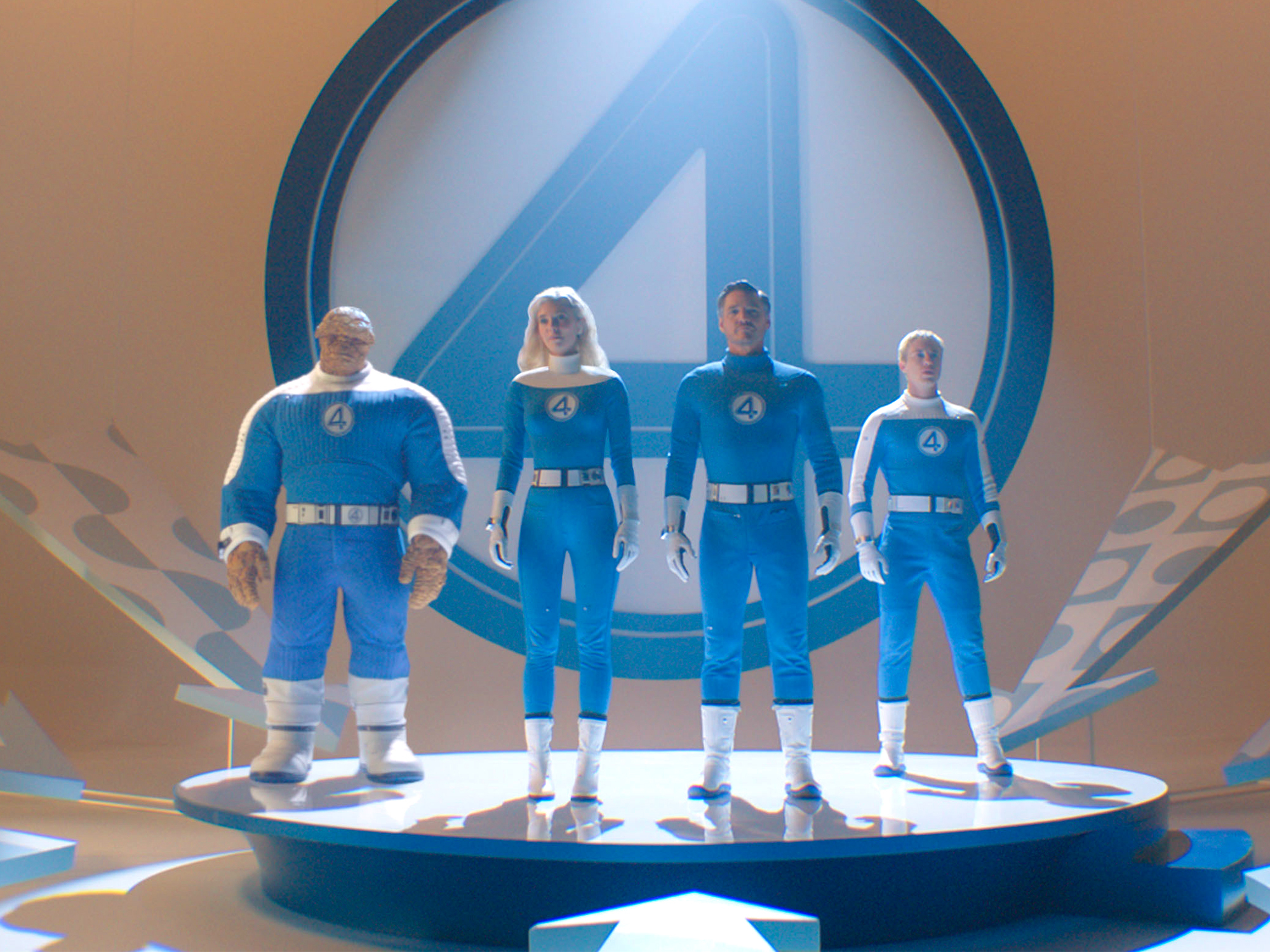
In 1968’s ‘Fantastic Four Annual #6’, Reed Richards and Sue Storm await the birth of their first child, Franklin, but the issue takes Reed away from the hospital on a desperate trip across dimensions to rescue his wife and child from a complicated birth. Stan Lee and Jack Kirby lay out an exciting and visually dazzling adventure outside of space and time with the most human stakes possible: a man moving heaven and earth for the love of his family.
The Fantastic Four: First Steps similarly foregrounds approaching parenthood against a background of cosmic wonder, and runs with it in a loose adaptation of Lee & Kirby’s Galactus Trilogy – first touched on Tim Story’s (awful) 2007 sequel Rise of the Silver Surfer. Shakman’s effort compresses the Four’s origin story into a TV documentary, recapping the story of four brave astronauts who were forever changed by cosmic rays, then became celebrities and ambassadors as well as scientists and superheroes. A quick and snappy montage through battles with classic foes brushes aside the Saturday Morning Cartoon villains for one more insurmountable: Galactus, a gigantic being who has to feed on planets to satisfy his insatiable hunger. To its credit, even amidst this cosmic scale, family is at the forefront of The Fantastic Four: First Steps, from its understated opening to the film’s MacGuffin being the arrival of Reed and Sue’s firstborn.
Get more Little White Lies
Not to mention this it’s the first Marvel film in a while that seems to actually strive for an individual visual identity. Particularly at home in the Baxter Building, the retrofuturistic production design is an easy highlight. It’s perhaps more Jetsons than Jack Kirby, full of beautiful analogue gizmos set amidst bold mid-century décor; the robot housekeeper H.E.R.B.I.E. with his tape deck face is one example of space age imagination.
Even the costume designs feel like a refreshing alternative to what’s become the norm: instead of leathery militaristic getup, the Four dress in what looks like the inner layer of an astronaut suit — a visual reminder that these are explorers and even ambassadors, not super cops. Just as the production design begins to lift First Steps out of Marvel Studios anonymity, Michael Giacchino’s score also feels full of character – appropriately grandiose in its choral refrain, lifting the action up with it.
But as pretty as this design looks and as good as the score sounds, Shakman’s direction at times seems like it’s shying away from the pulpy sci-fi style which it apparently wants to embody. It’s hard not to think about Down With Love director Peyton Reed, who had suggested a retro take in a now decades-old pitch for a Fantastic Four adaptation. (His Ant-Man films felt like a layup for an eventual crack at this, too). Down With Love crackled with life in every aspect, an emulation of Rock Hudson flicks which both fully embraced the tone of its inspirations, leaning into whimsical visual tricks and playful banter characteristic of the time. First Steps by comparison feels like it’s missing that extra step: while the world The Fantastic Four inhabit is bright and tactile, the camerawork which captures it is decidedly less adventurous, the performances within are muted.
Classically weird and colourful characters like Mole Man are rendered with disappointing normalcy (he’s just a guy in a suit and tie!), even if Paul Walter Hauser breathes cartoonish life into the minor role. The big bad Galactus’s design work fits in a little too neatly with the presentation of Marvel’s cosmic side as seen so far, better than the anonymous cloud of other adaptations but still not popping off the screen like he does on the page (that said, Ineson’s growling voice performance does well to carry the apocalyptic dread). Even Ebon Moss-Bachrach’s performance as The Thing feels a bit too reigned in, even if it conceptually makes sense that Shakman wishes to present his characters as a completely regular family.
Even in the best moments of First Steps, it’s hard to feel hopeful or even positive about the Marvel movies when even their creative successes herald the arrival of more creatively bankrupt money-making exercises: we’re duly reminded that “The Fantastic Four will return in Avengers: Doomsday”. You could almost extrapolate Galactus as a stand in for the encroachments of the Marvel Cinematic Universe – aware of what it’s doing and yet constantly caving to its hunger, a force which can only be delayed rather than destroyed. In this case, it’s at least put off until the post credits, the story here standing on its own until it’s time to be called up for Avengers duty.
In isolation, First Steps is a pretty good time, even if it feels as though it could push its aesthetic into more daring territory. This makes that inevitable interference all the more frustrating: when Marvel even shows a glimpse of any kind of visual ambition, we’re told not to expect that from these characters again. Two steps forward, one step back.


